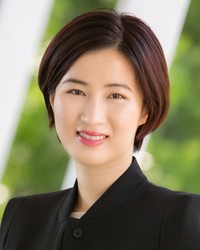Webinar Series
Hidden Non-Performing Loans in China
2021
Session Chair: Zheng (Michael) SONG
Professor at the Department of Economics, Chinese University of Hong Kong and Senior Fellow, ABFER
Tianyue RUAN, Assistant Professor of Finance, NUS Business School, National University of Singapore
Co-authors:
Ben CHAROENWONG, Assistant Professor of Finance, NUS Business School, National University of Singapore
Meng MIAO, Assistant Professor, Hanqing Advanced Institute of Economics and Finance, Renmin University
Discussant:
Chang-Tai HSIEH, Phyllis and Irwin Winkelried Professor of Economics; PCL Faculty Scholar, Booth School of Business, The University of Chicago and Senior Fellow, ABFER
Speakers
-

Tianyue RUAN
Assistant Professor in Finance, NUS Business School, National University of Singapore
Tianyue Ruan joined the Department of Finance at the National University of Singapore (NUS) Business School in 2018 as an Assistant Professor. Her main research interests are financial intermediation, household finance, and the Chinese economy. Her research has been published in the Proceedings of the National Academy of Sciences and funded by the Singapore Ministry of Education’s Social Science Research Thematic Grant. She received her Ph.D. in Finance from New York University Stern School of Business in the USA. As an undergraduate, she studied economics and finance at Peking University in China.
-

Chang-Tai HSIEH
Phyllis and Irwin Winkelried Professor of Economics; PCL Faculty Scholar, Booth School of Business, The University of Chicago and Senior Fellow, ABFER
Chang-Tai Hsieh conducts research on growth and development. His published papers include “The Life-Cycle of Plants in India and Mexico,” in the Quarterly Journal of Economics; "Misallocation and Manufacturing TFP in China and India," in the Quarterly Journal of Economics; "Relative Prices and Relative Prosperity," in the American Economic Review; "Can Free Entrybe Inefficient? Fixed Commissions and Social Waste in the Real Estate Industry," in the Journal of Political Economy; "What Explains the Industrial Revolution in East Asia? Evidence from the Factor Markets," in the American Economic Review; “The Allocation of Talent and US Economic Growth,” in Econometrica; “How Destructive is Innovation?” in Econometrica; and “Special Deals with Chinese Characteristics,” in the NBER Macroeconomics Annual.
Hsieh has been a visiting scholar at the Federal Reserve Banks of San Francisco, New York, and Minneapolis, as well as the World Bank's Development Economics Group and the Economic Planning Agency in Japan. He is a Research Associate for the National Bureau of Economic Research, a Senior Fellow at the Bureau for Research in Economic Analysis of Development, and a member of the Steering Group of the International Growth Center in London.
He is the recipient of an Alfred P. Sloan Foundation Research Fellowship, an Elected Member of Academia Sinica, and the recipient of the Sun Ye-Fang award for research on the Chinese economy. -

Zheng (Michael) SONG
Professor at the Department of Economics, Chinese University of Hong Kong and Senior Fellow, ABFER
Michael Song is a professor at the Department of Economics, Chinese University of Hong Kong (CUHK), an outstanding fellow of the Faculty of Social Science at CUHK, a co-director of CUHK-Tsinghua Joint Research Center for Chinese Economy and a distinguished visiting professor at the School of Economics and Management, Tsinghua University. His research focuses on Chinese economy and macroeconomics. He published papers on leading academic journals including American Economic Review and Econometrica. His paper “Growing like China” won Sunyefang Economic Science Award and the Best Paper Award for Chinese Young Economists. Before joining CUHK, Prof. Song was an associate professor of economics at Chicago Booth. Prof. Song is also a co-editor of China Economic Review, an associate editor of Econometrica and Journal of European Economic Association and an academic committee member of China’s Economics Foundation.
- 1
Session Format
Each session lasts for 1 hour 10 minutes (25 minutes for the author, 25 minutes for the discussant and 20 minutes for participants' Q&A). Sessions will be recorded and posted on ABFER's web, except in cases where speakers or discussants request us not to.
Registration
Registration has closed. Please visit the webinar main page for details on the next webinar.

